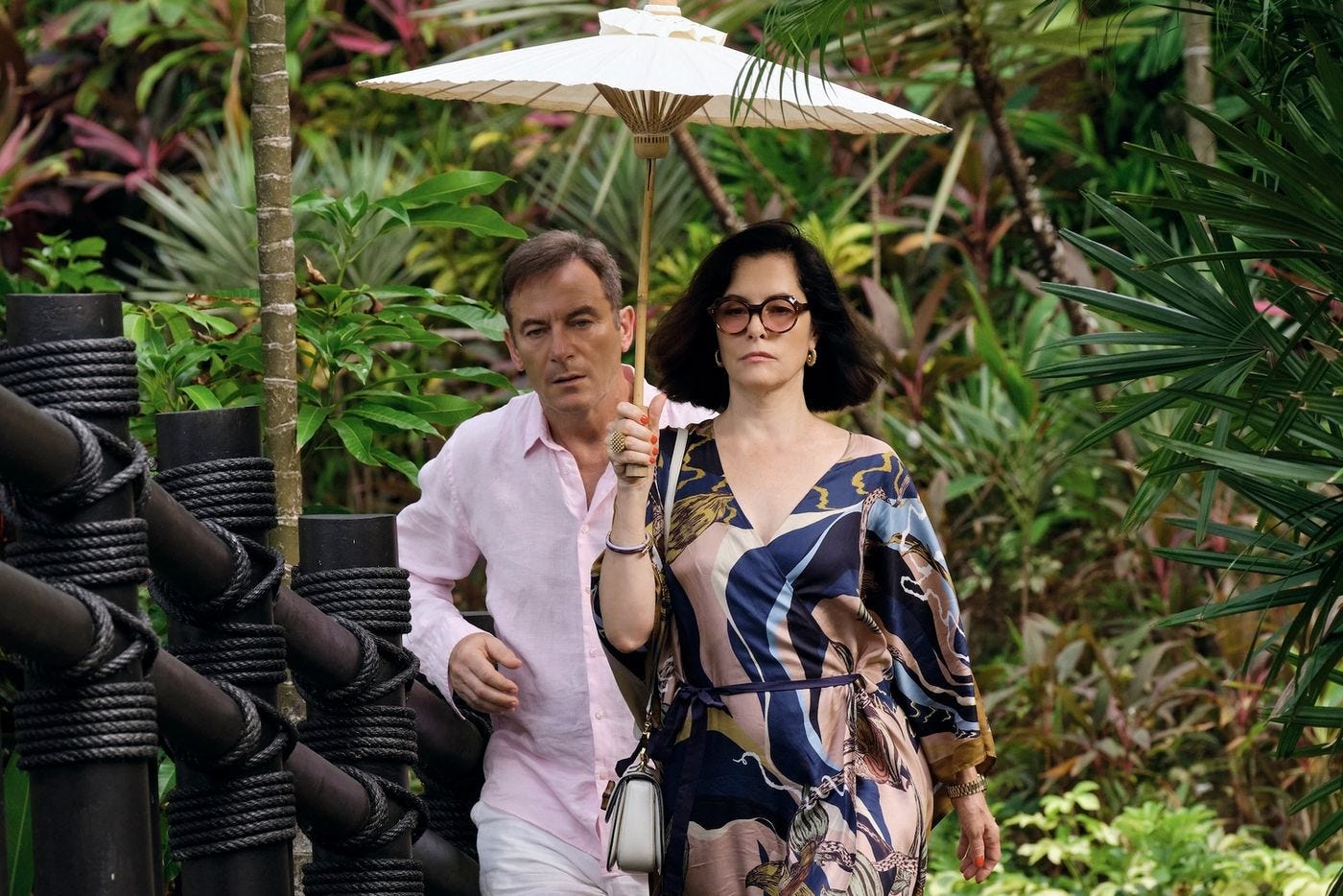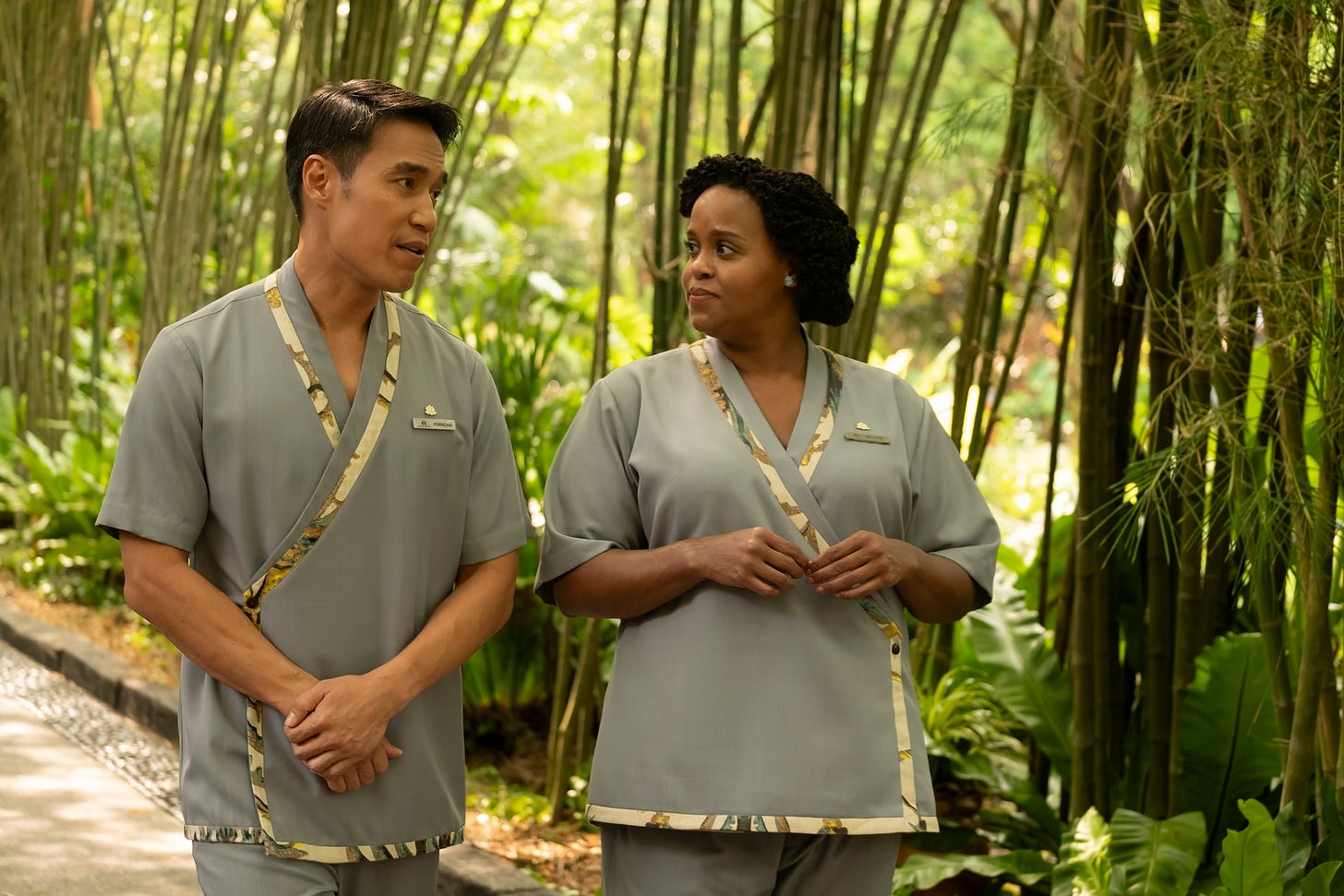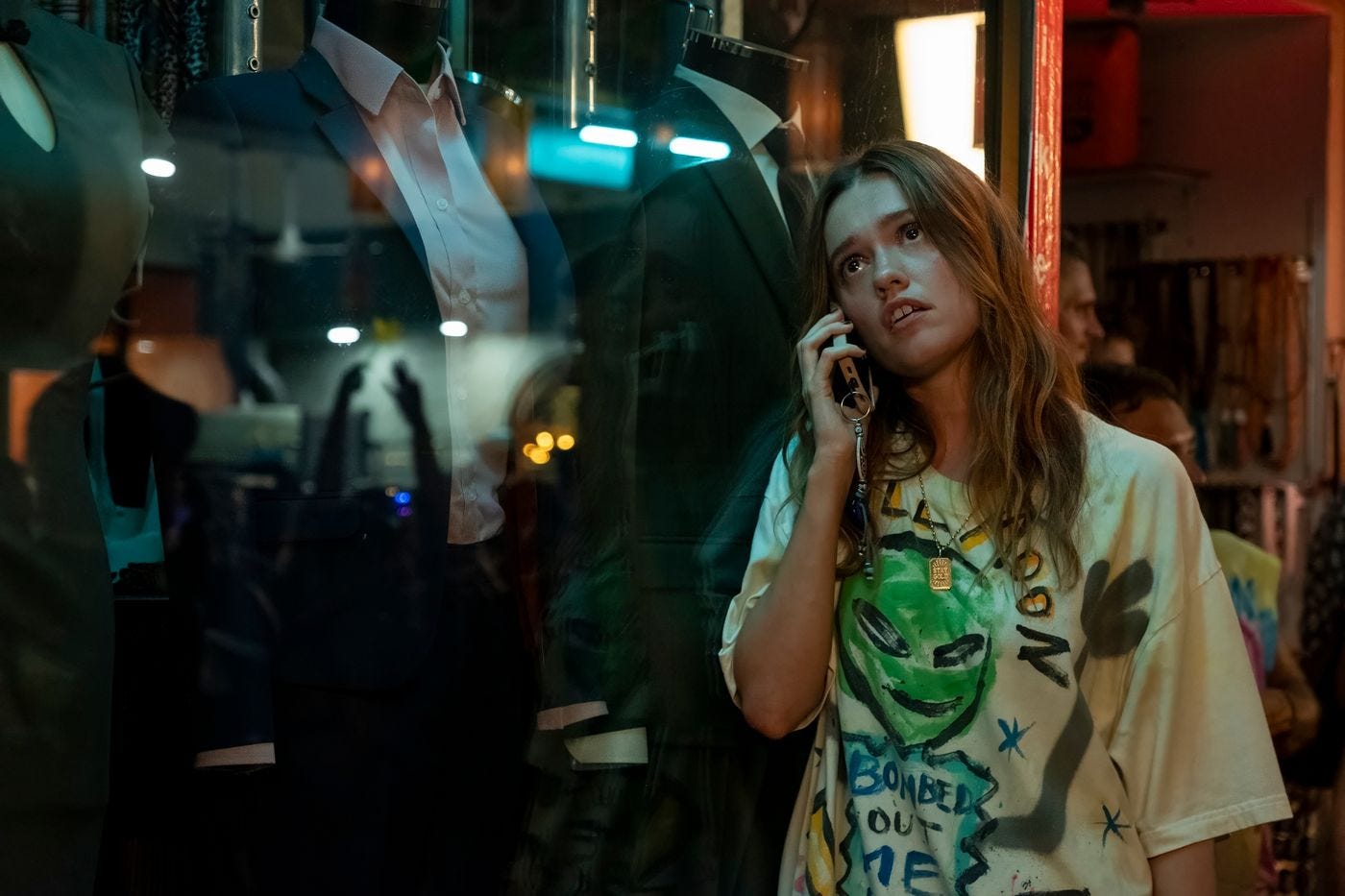The finale of The White Lotus’ third season aired this past Sunday, April 6th. This review will discuss the episode, the season and just for good measure (because who doesn’t love a party) all three seasons of the show to varying degrees.
Please consider this your spoiler warning.
As always, thanks for reading Off-Balance! Until next time,
Ryan.

Although initially commissioned as a one-and-done miniseries, it isn’t hard to see why HBO turned The White Lotus, the Mike White-created and led production into the quasi-anthology it has become, artistically bursting as it is.
An ensemble showcase, rich in production value and taking full advantage of the company credit card. Each season, quickly establishing a now familiar-framework: darkly comedic, occasionally honest satirical malice, the primary operating mode. The show, critiquing the lifestyles of the (almost exclusively) white and wealthy at changing locations of the titular hotel chain, alongside the societal framework that put them there.
Meanwhile, as a handful of locals struggle around them, at far different places on the ladder, murder and mayhem, inevitably come into play. This, a loose whodunnit, the end-game for what is a prioritization of raw character work as the driving action over explicit storytelling progression, for better or worse.
Though too often, during this, the show’s third season, which concluded this past Sunday? Worse, frequently, was the result. Too heavy, too telegraphed, too self-gratifying, with nothing but repeated malaise to show for it.
Sputtering and languishing to a well-presented if totally underwhelming end.
After Piper (Sarah Catherine Hook) dejectedly admits to her parents that her exploration into Buddhism was a bust - unable, she realizes, to live without her creature comforts -, to Victoria’s (Parker Posey) relief, Tim (Jason Issacs), continuing to spiral in his drug-induced haze, caves and gives into his darker impulses.
Believing, as he does, that accepting whatever sure-to-rights prison sentence awaits him for his vague financial crimes back home isn’t worth the pain his loved ones will go through because of it.
So, like any sane and well-adjusted individual, he promptly blends together some poisoned piña coladas as a supposed last-night-in-Thailand drink. A murder-suicide plot that spares only Lochlan (Sam Nivola) because earlier he had expressed to his father, unlike his siblings, an indifference to the security of their wealth.
Tim, however, after a moment of lucidity, backs out of the scheme at the literal last possible moment. Content supposedly, if one could call it that, in y’know, not Jim Jones-ing his family with a coconut twist.
It is… well, it provides a solid modicum of development for the character, at the very least.
After Lochlan later suffers through a life-and-death experience, upon accidentally ingesting the blender’s remnants, Tim, mumbling off some platitudes, commits himself to honesty come the episode’s end, once the Ratliff’s reconnect with their cell phones and through them, the outside world.
But considering Tim’s role, as one of two protagonists proper within the larger ensemble, season-wide, there was hardly anything of value here.
A slow burn is a slow burn, that is understood and Issacs played it all well enough but written as it was, regardless, the character’s arc felt lifeless. Stale, safe and mind-numbingly tedious. Watching what was basically seven consecutive weeks of Issacs, on a B-reel loop, juicing himself to the gills on benzos like he was being forced to chaperone at an Ed Sheeran concert, while repeatedly fantasizing about killing himself and his family. Only for the closing ninety minutes to finally, mercifully, move things along.
It had a baseline measure of tension sure but ultimately, no legitimate punch.
Nothing memorable said, nothing memorable presented, nothing memorable acted on.
The trio find themselves in a similar spot.
Putting aside their escalating personality clashes for one final night out, Laurie (Carrie Coon) breaks down, revealing how much she values her friendships with Kate (Leslie Bibb) and Jaclyn (Michelle Monaghan), despite their contentions during their time abroad. Coon, getting her biggest showcase moment of the season, delivers but it feels far too neat a bow to their collective arc, performative even, on both fronts. The realization coming, too late, that their plot-line needed to end somehow and with that acknowledgment, an acceleration through what remained of their beats, to no lasting impact.
Elsewhere on the resort however, that pre-established momentum lands a little stronger.
After Zion (Nicholas Duvernay) works to hype her up, Belinda (Natasha Rothwell) reluctantly agrees to a “sit-down” with Greg (Jon Gries).
And eventually, the mother-son duo break his resolve: in exchange for keeping quiet about what she (correctly) suspects transpired in Italy the previous season, Greg agrees to wire Belinda five million for her silence.
With it, she can finally open her dream spa, while, simultaneously, putting on her best Gunsmoke impression before Greg changes his mind. In the process though, it means cutting things off with Pornchai (Dom Hetrakul), following their doomed-to-be-brief romance. Ironically, by pulling from the same playbook Tanya (Jennifer Coolidge) did during her goodbye to Belinda, in the first season.
Now, whether Belinda can truly live with that decision, life-altering money be dammed, is the question, as her and Zion sail off into the sunset (something, through her physical acting alone, Rothwell conveys to effect). Though in the bigger-picture sense, it is, to the show’s credit, an interesting swerve on the one thread that has been carried consistently throughout the entirety of Lotus thus far: taking the most incorruptible character and forever binding her to blood money, while Greg, as it stands, actually gets away with it. Buying the silence of the one known person who could actively ID him for his role in Tanya’s murder (very Ripley-esque, admittedly).
For many, Coolidge was the heartbeat of the first two seasons but the character, being, purposefully, the antithesis of growth had hit a creative wall come the end of season two. Any further escapades no doubt would’ve lapsed into predictable redundancy, despite Coolidge’s much-praised, Emmy-winning performance.
Though in taking a character of her prominence off the board, especially as her presence still loomed, it meant others would then be required, even more so, to pick up the slack.
But try as he might, Saxon (Patrick Schwarzenegger) is hard-pressed to enjoy his final few days in Thailand.
He is still reeling, naturally, from the incestuous sexual experience he shared with his brother during their bender and Lochlan’s totally nonchalant stance on the whole thing doesn’t help matters whatsoever.
The younger Ratliff, freely admits that he was consciously aware of what was happening, feeling that, as a “people pleaser”, he was doing something in Saxon’s best interest.
Saxon, horrified, demands they memory-hole the whole thing (if only, presumably, to save it for their therapists fifteen years from now) and for the last time, finds himself on the beach, next to Chloe (Charlotte Le Bon) and Chelsea (Aimee Lou Wood).
Though after being, rightfully, spurned by Chelsea during their shared mediation session and having rejected Chloe’s offer to be apart of her and Greg’s sex life, Saxon finally, fully realizes that he isn’t everything he pretends to be. A slow deconstruction of his ego, as he admitted as much to his father earlier in the season. Acknowledging he didn’t have any identity beyond his work and then, again, the incest, forcing him to reevaluate both his internal and external identities.
Enlightenment, not something he can blunder his way through with faux bravado or overconfidence, specifically regarding how he engages with women and his approach to sex. Yet knowing just how he got there, there is some thinking that it’ll actually stick, once he returns home.
Schwarzenegger has gotten his fair share of flack in the discourse during the season’s run, be it for the supposed nepotism or general criticism of his performance. Though it requires an actor of talent, one way or another, in taking a character who was (and still is) a slimy, frat-finance bro at the onset and leaving him in a kinda-sorta sympathetic place come the end. Still unquestionably grating but not wholly absent some depth, in delivering what is easily, the most visible character arc of the season.
Rick (Walton Goggins), conversely, doesn’t have the same luck. Chelsea neither.
Leaving Bangkok and a totally off-the-wagon Frank (Sam Rockwell) to his own manic devices, Rick returns to the resort and finally, seemingly at peace, sweeps Chelsea off her feet.
Admitting his belief that they’ll be together forever, much to her delight, instead of immediately heading to the airport because that would be the smart play: though, if Rick has proven anything this season, it is that the wannabe-conman is not one to think rationally through any of his decisions… including, as it comes to pass, the consequences.
After Jim (Scott Glenn), unsurprisingly, threatens him at subtle gunpoint for his actions the previous episode and gets a couple digs in at Rick’s mother for good measure, despite Chelsea’s pleas, Rick just can’t let it go.
Confronting Jim one last time, he promptly shoots him point-blank in the chest, Sritala (Patravadi Mejudhon), screaming both in horror and with the grand revelation of the season: Rick, for all his daddy issues, just killed his biological father.
It is insulting, frankly.
Ever since Rick told Chelsea, weeks ago, their true reason for being in Thailand, without any further dialogue or storytelling threads put down, the easy money was on this reveal and Glenn’s delivery previously solidified it.
No mystery, no suspense, just literal hours wasted, in confirming a red herring never subverted.
Regardless, Rick doesn’t have much time to process this news, as Chekhov’s White’s Gunshots arrive: immediately pinned down by Sritala’s bodyguards, Rick drops them both, only to realize that Chelsea, caught in the crossfire, has died in his arms. Yet as he carries her away, distraught, Gaitok (Tayme Thapthimthong) appears, gun in hand.
Clearly divided between duty and belief though he is, he follows Sritala’s orders and shoots Rick dead, in a bookend to those previously dropped hints, with Alex Ovechkin-approved precision.
Bad things happening in threes and soulmates after all: just as Chelsea predicted, though no doubt not in the way she expected.
So, on cue, as the body bags arrive and the credits roll, this ending which has been largely circulating in the major spaces online, in description, as something of a Greek tragedy instead plays, like so much of the rest of the episode, the season, as potential squandered.
The catch with Lotus of course, is that while neither the deaths nor the triggerman really matter in the grand scheme of things, the journey and how the characters react to it, still does.
Perhaps though, these missteps, they aren’t entirely unexpected.
As Lotus fully transitions into its Acclaimed Show on TV Era, it has come with a heightened sense of scrutiny and observation, on both sides of the aisle.
Season three’s eight episode order was the largest of the series so far, fashion collaborations with known outlets have proven themselves to be big business and the show’s profile, wholesale, has never been more pronounced.
But none of that actively transitioned to the screen this season: painfully, artificially paced, poorly structured and narratively unsatisfying. Leaving little for the viewer to deduce and enjoy themselves without being spoon-fed, as it crammed no less than three major characters (Zion, Frank and Jim) into the final third of episodes. Hoping their arrival, as exposition stand-ins, could divert attention away from the increasingly weak supports holding everything together (it didn’t take).
Maybe White, who is credited as the sole writer, director and creative, is overextended. Maybe he’s too busy feuding with his now-former composer. Or maybe he’s just smug and overconfident, given the nature of his success, as his response to such criticism seems to indicate.
Though just because White wants to wave away those critiques as world-building or nothing but “vibes”, in that, “if you didn’t like it, you didn't get it” way, that doesn’t mean they’re without merit.
Not just technically or mechanically but thematically, as well, as from spoke too in her piece regarding the show earlier this month:
Then there’s the fetishization of Thailand and Thai people itself. There are winks and nods to racial, sexual and class dynamics in Thailand in the first few episodes, but never any substantive commentary… Which leads me to the controversial monologue with Frank/Sam Rockwell talking about how he fucked Asian girls, wanted to be an Asian girl, then turned to Buddhism to detach himself from his earthly desires. White, who the New Yorker profile says is known for “[giving] a character a speech that’s both serious and funny—not wholly convincing but not wholly inane,” gifts Frank a whole, uninterrupted five minutes as Rick looks on in a trance.
There has already been much discussed on the Internet analyzing White’s deep intentionality behind the monologue. He’s trying to make a statement about men’s repressed sexuality! He’s trying to explore the fetishization of Asian women! Men out there watching this are going to take a hard look at themselves after hearing these words, and Mike White did that!
But is that giving Mike White, and White men, too much credit? I don’t know that White actually took the time to delve into the history of imperialist sexual violence against Asian women, or else he wouldn’t have casually thrown that monologue in there.
Iris, speaking to these elements with expertise and understanding, highlights in her way, that of acclaim though it may be, again, that doesn’t detach Lotus from being viewed under a closer lens.
No doubt it will find itself in Emmy contention once more and there will be continued fanning over its supposed artistic genius, with a fourth season already in development. Yes, the broader production elements remain engaging, the performances were terrific, as expected and when it chose too, the show did present some strong characterization, if sporadically.
But once the curtain went down, the third season of The White Lotus wasn’t just a step back from its predecessors, it was a weak season of television, period.
The type that, if it didn’t already have that name recognition in the back pocket, would’ve seen itself cancelled without second thought.
It is clear now that the show is, already, pushing up against its boundaries and established ability with diminishing returns now actively apart of the equation.
To whatever comes next?
Good luck sorting through the mess of what came before.








